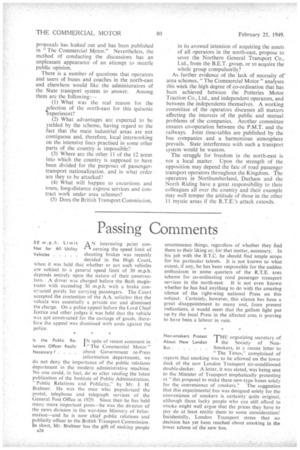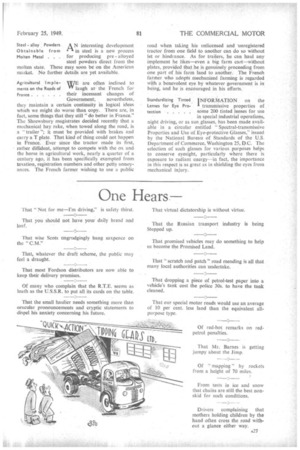Passing Comments
Page 2

Page 3

If you've noticed an error in this article please click here to report it so we can fix it.
30 m.p.h. Limit A N interesting point con
Not for All Utility cerning the speed limit of Vehicles shooting brakes was recently decided in the High Court, when it was held that whether or not such vehicles are subject to a general speed limit of 30 m.p.h. depends entirely upon the nature of their construction. A driver was charged before the Bath magistrates with exceeding 30 m.p.h. with a brake constructed purely for carrying passengers. The Court accepted the contention of the A.A. solicitor that the vehicle was essentially a private car and dismissed the charge. On a police appeal before the Lord Chief Justice and other judges it was held that the vehicle was not constructed for the carriage of goods, therefore the appeal was dismissed with costs against the police.
Is the Public ReIN spite of recent comment in lations Officer Really 1" The Commercial Motor" Necessary . . . . about Government re-Press information departments, we do not deny the importance of the public relations department in the modern administrative machine. No one could, in fact, do' so after reading the latest publication of the Institute of Public Administration, "Public Relations and Publicity," by Mr. J. H. Brebner. He was the man who popularized the postal, telephone and telegraph services of the General Post Office in 1929. Since then he has held many more important posts—he was the director of the news division in the war-time Ministry of Information—and he is now chief public relations and publicity officer to the British Transport Commission., In short, Mr. Brebner has the gift of making people
A26 countenance things, regardless of whether they find them to their liking or, for that matter, necessary. In his job with the B.T.C. he should find ample scope for his particular talents. It is not known to what extent, if any, he has been responsible for the sudden enthusiasm in some quarters of the R.T.E. area scheme for co-ordinating road passenger transport services in the north-east. It is not even known whether he has had anything to do with the amazing silence of the right-wing national Press on this subject. Certainly, however, this silence has been a great disappointment to many and, from present indications, it watild seem that the gallant tight put up by the local Press in the affected area is proving to have been a labour in vain.
Non-smokers Protest THE organizing secretary of About New London the Society of Non Bus Smokers, in a recent letter to "The Times," complained of reports that smoking was to be allowed on the lower deck of the new London Transport air-conditioned double-decker. A letter, it was stated, was being sent to the Minister of Transport emphatically protesting at "this proposal to make these new-type buses solely for the convenience of smokers." The suggestion that this experimental bus was designed solely for the convenience of smokers is certainly quite original, although those lucky people who can still afford to smoke might well argue that the prices they have to pay do at least entitle them to some consideration! Incidentally, London Transport states that no decision has yet been reached about smoking in the lower saloon of the new bus.
Steel alloy Powders Obtainable from Molten Metal ,
AN interesting development in steel is a new process for producing pre alloyed steel powders direct from the molten state. These may soon be on the American market. No further details are yet available.
Agricultural I rnplements on the Roads of France
WE are often inclined to VT laugh at the French for their incessant changes of
Government; nevertheless, they maintain a certain continuity in logical ideas which we might do worse than copy. There are, in fact, some things that they still "do better in France." The Shrewsbury magistrates decided recently that a mechanical hay rake, when towed along the road, is a " trailer "; it must be provided with brakes and carry a T plate That kind of thing could not happen in France. Ever since the tractor made its first, rather diffident, attempt to compete with the ox and the horse in agricultural work, nearly a quarter of a century ago, it has been specifically exempted from taxation, registration numbers and other petty annoyances. The French farmer wishing to use a public
road when taking his unlicensed and unregistered tractor from one field to another can do so without let or hindrance. As for trailers, he can haul any implement he likes—even a big farm cart—without plates, provided that he is genuinely proceeding from one part of his farm land to another. The French fanner who adopts mechanized farming is regarded with a benevolent eye by whatever government is in being, and he is encouraged in his efforts.
Standardizing Tinted INFORMATION on the Lenses for Eye ProI transmissive properties of , section some 200 tinted lenses for use in special industrial operations, night driving, or as sunglasses, has been made available in a circular entitled "Spectral-transmissive Properties and Use of Eye-protective Glasses," issued by the National Bureau of Standards of the U.S. Department of Commerce, Washington 25, D.C. The selection of such glasses for various purposes helps to conserve eyesight, particularly where there is exposure to radiant energy—in fact, the importance in this respect is as great as in shielding the eyes from mechanical injury.




























